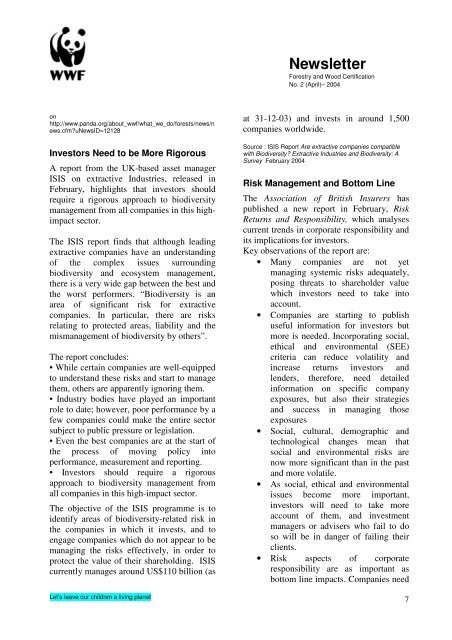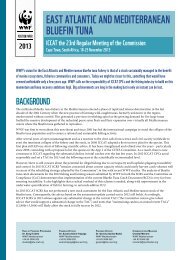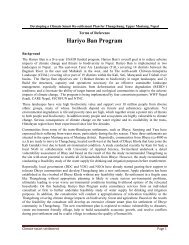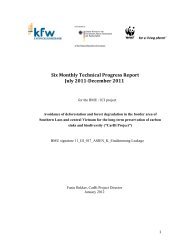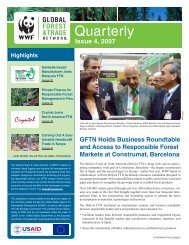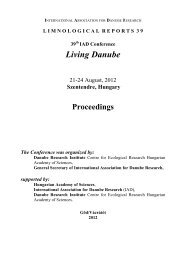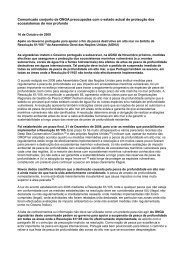Newsletter - WWF, Abu Dhabi unveil plans for sustainable city
Newsletter - WWF, Abu Dhabi unveil plans for sustainable city
Newsletter - WWF, Abu Dhabi unveil plans for sustainable city
You also want an ePaper? Increase the reach of your titles
YUMPU automatically turns print PDFs into web optimized ePapers that Google loves.
on<br />
http://www.panda.org/about_wwf/what_we_do/<strong>for</strong>ests/news/n<br />
ews.cfm?uNewsID=12128<br />
Investors Need to be More Rigorous<br />
A report from the UK-based asset manager<br />
ISIS on extractive Industries, released in<br />
February, highlights that investors should<br />
require a rigorous approach to biodiversity<br />
management from all companies in this highimpact<br />
sector.<br />
The ISIS report finds that although leading<br />
extractive companies have an understanding<br />
of the complex issues surrounding<br />
biodiversity and ecosystem management,<br />
there is a very wide gap between the best and<br />
the worst per<strong>for</strong>mers. “Biodiversity is an<br />
area of significant risk <strong>for</strong> extractive<br />
companies. In particular, there are risks<br />
relating to protected areas, liability and the<br />
mismanagement of biodiversity by others”.<br />
The report concludes:<br />
• While certain companies are well-equipped<br />
to understand these risks and start to manage<br />
them, others are apparently ignoring them.<br />
• Industry bodies have played an important<br />
role to date; however, poor per<strong>for</strong>mance by a<br />
few companies could make the entire sector<br />
subject to public pressure or legislation.<br />
• Even the best companies are at the start of<br />
the process of moving policy into<br />
per<strong>for</strong>mance, measurement and reporting.<br />
• Investors should require a rigorous<br />
approach to biodiversity management from<br />
all companies in this high-impact sector.<br />
The objective of the ISIS programme is to<br />
identify areas of biodiversity-related risk in<br />
the companies in which it invests, and to<br />
engage companies which do not appear to be<br />
managing the risks effectively, in order to<br />
protect the value of their shareholding. ISIS<br />
currently manages around US$110 billion (as<br />
Let’s leave our children a living planet<br />
<strong>Newsletter</strong><br />
Forestry and Wood Certification<br />
No. 2 (April)– 2004<br />
at 31-12-03) and invests in around 1,500<br />
companies worldwide.<br />
Source : ISIS Report Are extractive companies compatible<br />
with Biodiversity? Extractive Industries and Biodiversity: A<br />
Survey February 2004<br />
Risk Management and Bottom Line<br />
The Association of British Insurers has<br />
published a new report in February, Risk<br />
Returns and Responsibility, which analyses<br />
current trends in corporate responsibility and<br />
its implications <strong>for</strong> investors.<br />
Key observations of the report are:<br />
• Many companies are not yet<br />
managing systemic risks adequately,<br />
posing threats to shareholder value<br />
which investors need to take into<br />
account.<br />
• Companies are starting to publish<br />
useful in<strong>for</strong>mation <strong>for</strong> investors but<br />
more is needed. Incorporating social,<br />
ethical and environmental (SEE)<br />
criteria can reduce volatility and<br />
increase returns investors and<br />
lenders, there<strong>for</strong>e, need detailed<br />
in<strong>for</strong>mation on specific company<br />
exposures, but also their strategies<br />
and success in managing those<br />
exposures<br />
• Social, cultural, demographic and<br />
technological changes mean that<br />
social and environmental risks are<br />
now more significant than in the past<br />
and more volatile.<br />
• As social, ethical and environmental<br />
issues become more important,<br />
investors will need to take more<br />
account of them, and investment<br />
managers or advisers who fail to do<br />
so will be in danger of failing their<br />
clients.<br />
• Risk aspects of corporate<br />
responsibility are as important as<br />
bottom line impacts. Companies need<br />
7


